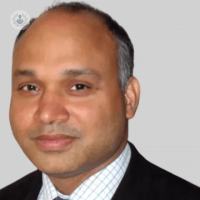What to know about varicose veins
Written in association with:Varicose veins are veins that appear swollen and twisted, typically occurring in the legs and feet. In this article, consultant vascular surgeon Professor Alok Tiwari explains how they’re caused and how they can be treated.

What are varicose veins and how are they caused?
Varicose veins are visible on the surface of the skin. They may appear as blue or purple, and lumpy or bulging. They occur due to dysfunction of the valves within the veins, that carry oxygen-infused blood to the heart, with which the blood starts flowing backwards and collates instead. Varicose veins are more likely to affect older people, pregnant women, and those with obesity.
They may primarily be a cosmetic concern, but they can cause symptoms such as:
- Aching and heavy-feeling legs
- Burning or throbbing sensations
- Dry and itchy skin in the affected areas (varicose eczema)
- Cramps
- Swollen ankles and feet
- Rashes
The symptoms may be exacerbated after long periods of standing.
How are varicose veins diagnosed?
Varicose veins may be identified by sight, but they can only be officially diagnosed by a Doppler ultrasound, which is an imaging scan that is designed to show the movement of blood through the blood vessels (or lack thereof, in the case of varicose veins).
How are varicose veins treated?
Varicose veins can worsen if they are not treated, and complications may arise such as phlebitis, which is the swelling of the veins, and blood clots superficially or deep within the leg (deep vein thrombosis).
Conservative treatment for varicose veins includes compression socks and stockings, and elevating the legs above the heart for stretches of time to help with circulation.
If conservative treatment is ineffective, then more thorough treatments or procedures for varicose veins can be explored. These tend to be outpatient procedures such as:
- Sclerotherapy, which is where saline or chemical solutions are injected into the varicose veins to make them defunct, so the blood flow is redirected to other, non-varicose veins instead.
- Thermal ablation, which is where laser or radiofrequency energy, directed through a catheter that is inserted into the vein, destroys or ablates the varicose vein, sealing them and redirecting the blood to other, non-varicose veins.
- Vein stripping, which is a surgical procedure to physically remove the varicose veins.
- Microphlebectomy, another surgical procedure in which varicose veins are removed through small incisions.
Can varicose veins be prevented?
It is believed that varicose veins may be avoided with good circulation – this means exercising regularly, eating healthily, not wearing clothing that is too tight or restrictive, and practising good sitting habits like not crossing the legs and putting up the feet while sitting.
If you are struggling with varicose veins, you can consult with Professor Tiwari via his Top Doctors profile.


